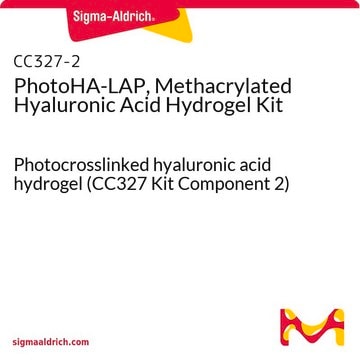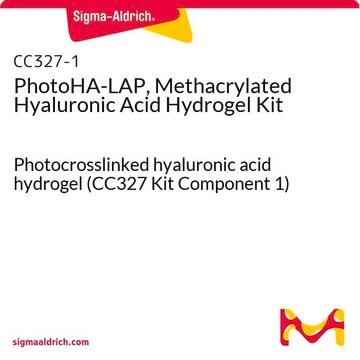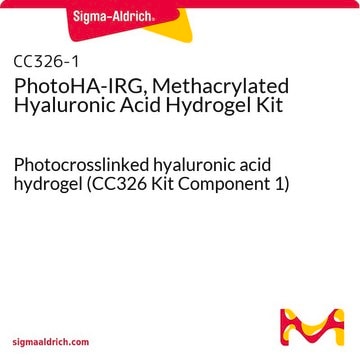CC328-1
PhotoHA-RUT, Methacrylated Hyaluronic Acid Hydrogel Kit
Photocrosslinked hyaluronic acid hydrogel (CC328 Kit Component 1)
About This Item
Recommended Products
form
lyophilized powder
application(s)
cell analysis
General description
Application
Packaging
Components
Note: The complete PhotoHA-RUT, Methacrylated Hyaluronic Acid Hydrogel Kit (CC328) consists of CC328-1 and CC328-2 sold seperately.
Quality
Disclaimer
signalword
Danger
Hazard Classifications
Acute Tox. 4 Oral - Ox. Sol. 3 - Resp. Sens. 1 - Skin Irrit. 2 - Skin Sens. 1 - STOT SE 3
target_organs
Respiratory system
Storage Class
5.1B - Oxidizing hazardous materials
Certificates of Analysis (COA)
Search for Certificates of Analysis (COA) by entering the products Lot/Batch Number. Lot and Batch Numbers can be found on a product’s label following the words ‘Lot’ or ‘Batch’.
Already Own This Product?
Find documentation for the products that you have recently purchased in the Document Library.
Articles
Methacrylated hydrogels enable 3D cell culture scaffolds and bioprinting using light crosslinking.
Explore the role of hyaluronan, hyaluronic acid structure, hyaluronan synthesis & degradation, and more. Find GAGs, hydrogels, and scaffold kits.
Hydrogela are the most widely used systems for 3D cell culture. Learn more about this technology (what are hydrogels? How to chose?)
Our team of scientists has experience in all areas of research including Life Science, Material Science, Chemical Synthesis, Chromatography, Analytical and many others.
Contact Technical Service











